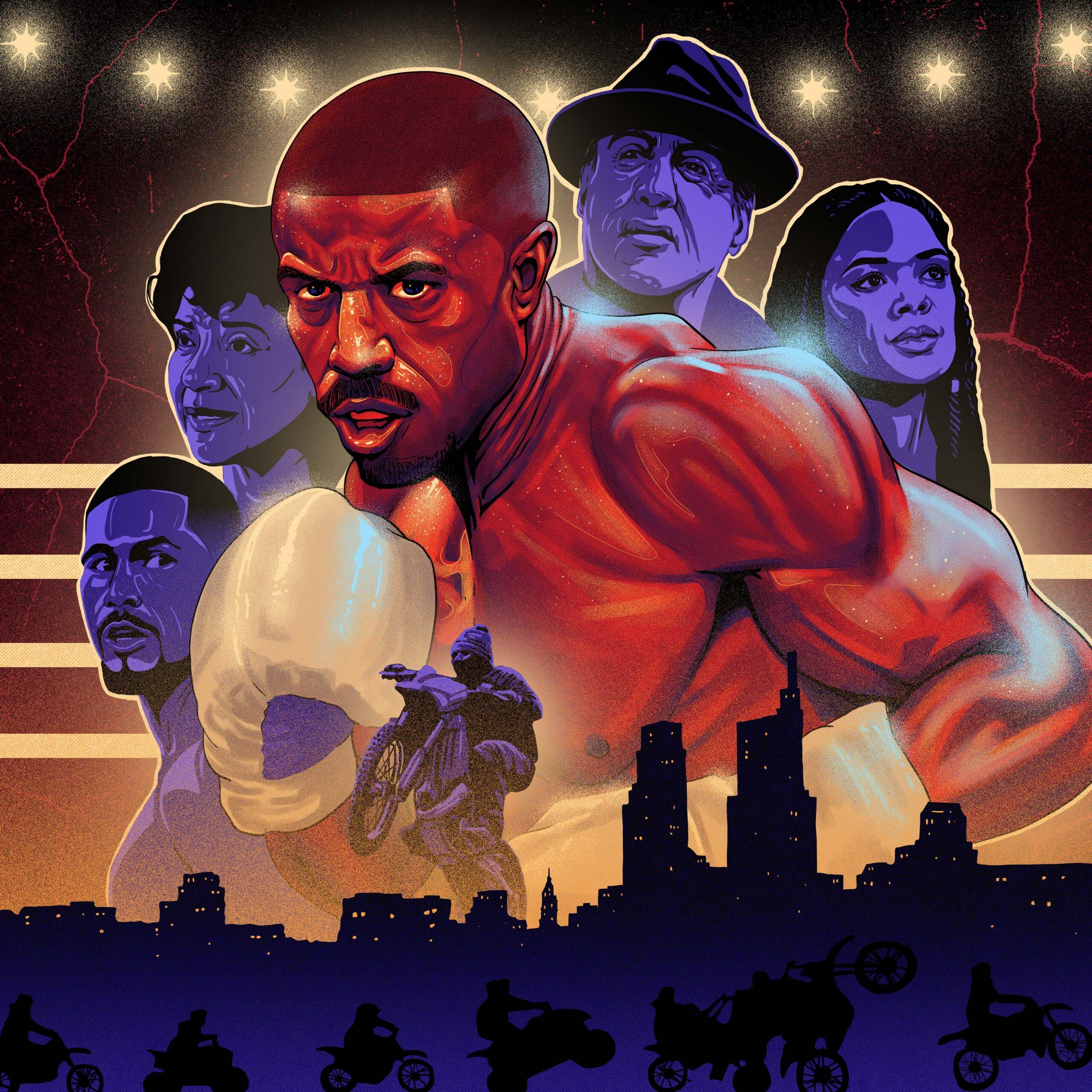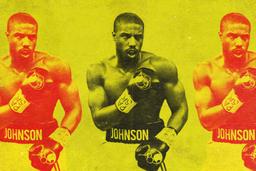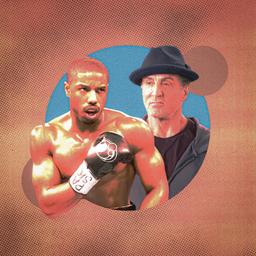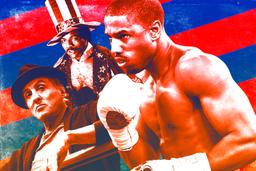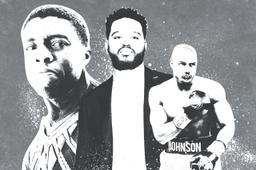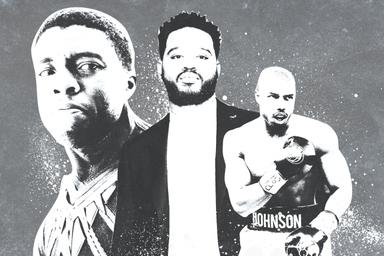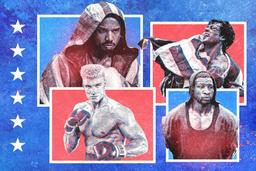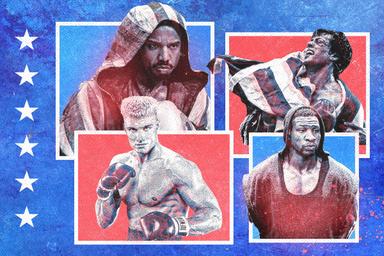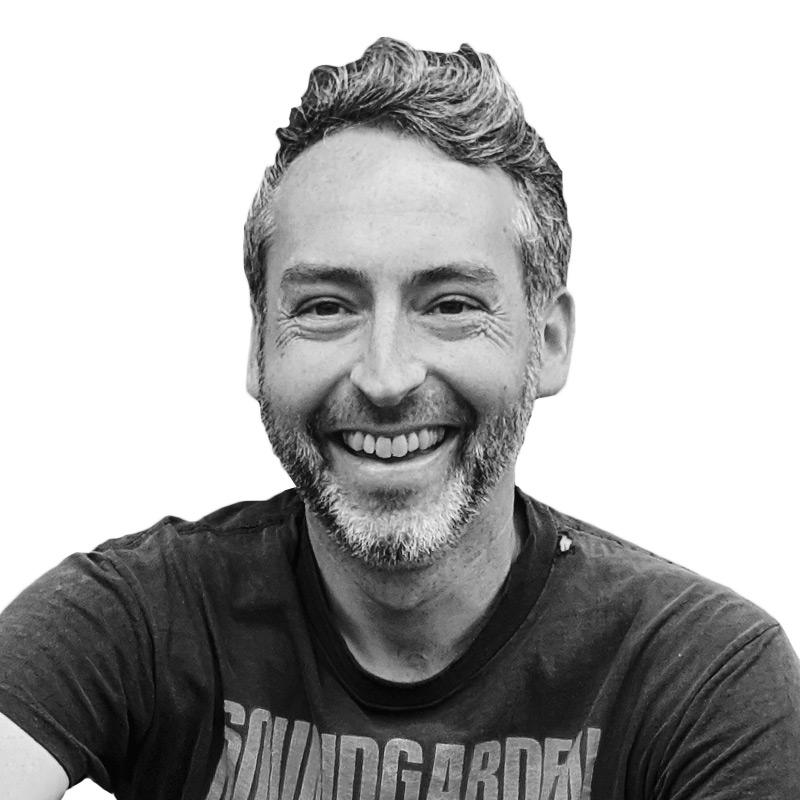If I Fight, You Fight: The Oral History of ‘Creed’
Ten years ago, Ryan Coogler and Michael B. Jordan cemented their partnership and pulled off a million-to-one shot, bringing the ‘Rocky’ franchise into a new eraHow many times has Ryan Coogler seen the Rocky movies? By now he’s lost count.
When he was growing up in the East Bay in California in the 1990s, his father, Ira, introduced him to the series. Rocky II was his dad’s favorite. “It wouldn’t surprise me if I’ve seen that movie 500 times,” Coogler says. Ira could quote the scene in which trainer Mickey gives his distraught protégé a late-night pep talk in a church verbatim. “That was his get down,” Coogler says.
Ira also showed his sons clips from the films before their football games to fire them up. As a kid, Coogler watched all of the sequels over and over. And then he returned the favor. “On Father’s Day, we would buy him the VHS box set,” he says. “And later on, we got a DVD player, and we got him the DVD box set.”
By the time Coogler enrolled at USC film school in the 2000s, he was already a Rocky die hard. But he admits that there was a giant hole in his fandom. He’d never seen the original. So he headed to the cinema library to right that wrong. What Coogler saw threw him, in a good way. “I couldn’t believe it, bro,” he says. This wasn’t the blockbuster version of Rocky he was raised on. It was a ’70s indie drama written by and starring a then-unknown actor who plays a reluctant enforcer for a loan shark. “It is like a mob movie where they follow the wrong guy,” Coogler says.
Coogler loved it. And not long after completing his Rocky education, he started thinking about making a boxing movie. He eventually realized that he wanted to do his own Rocky flick, one that paid homage to the source material, pushed the franchise forward, and reflected his own experience as a young Black man in America.
Pulling that off required flipping the script. The center of Coogler’s film would be a descendant of Rocky Balboa’s greatest opponent: Apollo Creed. When they were prepping to make Coogler’s first feature, Fruitvale Station, he asked Michael B. Jordan whether he’d ever be interested in taking up the mantle of Carl Weathers years later. The actor didn’t have to think it over. “It was like, ‘Yeah, cool. Let’s do it,’” Jordan says. “That’s how strong our dynamic and our connection and relationship was.”
But the making of Creed, which came out 10 years ago on Tuesday, is a true underdog story. Before he was staging hyperrealistic boxing sequences and intricate training montages on the streets of Philadelphia, the 20-something director had to convince a Hollywood legend to bring his most iconic character back to the big screen.
Coogler had no clue that what he was proposing was, much like Rocky Balboa, a million-to-one shot. “It was impossible, man,” he says. “I probably had a better shot at becoming an astronaut.”
Part 1: “We Was Making It, Man”
Coogler had to travel a long road before pitching Sylvester Stallone. He first kicked around the idea for Creed at USC, where he made several award-winning short films. Way back then, his classmates—and now collaborators—had a feeling that he had a bright future ahead of him.
Michael Shawver (editor): Most student films are about death or breakups because that’s the only conflict people know at that point in their life. But Ryan would make stuff about society, race, family—things that were so specific and unique and beautiful and sometimes with no dialogue, and you just wanted to cry at the end of it.
Ludwig Göransson (composer): He always was telling me about the movies he was going to make. And one time we were sitting down and having coffee or ice cream somewhere in Silver Lake, and he was telling me about how he was going to make a boxing film.
Ryan Coogler (director and cowriter): I knew I was going to make a movie about a boxer. I think it’s because it’s the simplest sport to film in a technical and financial sense. It’s inherently cinematic without being crazy expensive.
Aaron Covington (cowriter): Me and Ryan were in film school. This was like 2009. We lived together our last year there. We were just talking, and he was like, “We should see if there’s anything we could collaborate on.” I’m like, “Of course, yeah. I would love to. What are you trying to do?” And then he told me the basic idea of what Creed would be, and immediately I thought that was a good idea.
Coogler: My dad, he liked the Apollo scenes.
Covington: Almost any franchise that has a Black character, we never get the story lines, we never get the love interest, the characters are so similar from property to property. And this really ended up being such a great opportunity to be like, “Hey!” ’Cause for me, growing up, yeah, I like Rocky, but I don’t identify necessarily with Rocky. I like Apollo. Apollo had that build. Rocky was ripped, but Apollo was like a statue. And he was so confident and so capable. And eventually, he loses. The title of the movie is Rocky, so we know Rocky wins, but that doesn’t mean we don’t have an affinity for Apollo. And Apollo was never a bad guy; he wasn’t a villain.
Shawver: Ryan does that with all of his characters. He told me early on, “I don’t like the term villain. It’s antagonist.”
Coogler: There’s a great scene in Rocky II where Apollo’s trainer, Duke, is explaining to him that we shouldn't fight this guy again. My dad loved that. It’s brilliant writing, man. Sly did brilliant characterization. For me, Creed is birthed out of those scenes and that relationship. It’s like my relationship with my father.
Covington: Ryan’s connection to his dad and this idea of the generational replacement.
Coogler: My dad got sick, and that was when I was like, “Oh, Rocky.”
Covington: Rocky is older and can’t do things and gets sick, and that was part of Ryan’s personal story. We just had some notes about that, and then we had notes about who Adonis should be. We had a couple different names before it came to Adonis. Aeneas was one, which is another classical name. We were just like, “He’s confident, cocky …”
Coogler: Either a boxer has nothing, or they’ve got a family that’s pushing them towards the sport, or they’ve got a legacy with something to prove, right? You’ve got to show the reasons that they’re getting into the ring. With Creed, what was great about it was it was a mystery. It’s a mystery of why this guy is so hell-bent on this. He never knew his dad.
Covington: I was like, “Yeah, we’ve got to have an Adrian for our guy.” [Ryan] was like, “Oh, yeah.” He hadn’t thought about that yet, so then eventually that became Bianca. Then it was like, “What is she in the world?” ’Cause we weren’t going to make her a pet shop owner.
Coogler: Our movie, it’s like a weird baby of Rocky, Rocky II, and Rocky V. But it’s about Apollo Creed, so obviously, III and IV have to be in there, right? It’s like this amalgamation of all the movies before it.
Michael B. Jordan (Adonis Creed): The characters were so rich, and it fit seamlessly into the other movies but had its own identity. I think one of the things that, looking back at it, I could compare it to, but only in the sense of a feeling, is Friday Night Lights. You have a show that’s going on and exists on its own, and then all of a sudden, you get this remix version.
After graduating from film school in 2011, Coogler started working on what became his first feature: Fruitvale Station. Around that time, WME signed him. Joining the mega talent agency turned out to be serendipitous.
Coogler: I wound up meeting Craig Kestel and eventually Charles King, who were at WME, which happened to be where Stallone was represented. And the agents had relationships. Stallone’s agent at the time was a guy named Adam Venit. And Venit had a relationship with my agents. When they signed me based off the Fruitvale script, I also told them I had this other idea I was working on. I remember talking to Charles about it and then talking to Craig about it, and Craig was like, “Hey, wait, is Stallone in this movie?” And I’m like, “Yeah.” And he’s like, “Wait, is this Rocky VII?” I’m like, “Yo, kind of.”
Covington: His agent is like, “Oh, Stallone’s agent is two doors down.”
Coogler: He put me with Venit, who put me with Kevin King Templeton, who was Stallone’s business partner at the time. I pitched him while I was in prep on Fruitvale, and he was generous. And I pitched [producer] Irwin Winkler eventually and [producer] Bob Chartoff, rest in peace. But I didn’t know if it was going to go anywhere, man.
Jordan: First of all, Ryan pitched me that movie before we shot one frame of Fruitvale Station.
Ryan put everybody on his shoulders and carried the whole thing from beginning to end.Nicolas Stern
Coogler: I remember when I told him about it, and he was like, “Bro, I’m in.” But he was like, “Bro, are you crazy?” Me and Mike made Fruitvale, and Fruitvale was well received. And I think somebody showed Stallone Fruitvale, and then he doubled back, and he was like, “Hey man, let’s keep talking.”
Covington: Stallone didn’t think it was a great idea at first.
Coogler: The big fear with my dad was that he had ALS. In the initial script I wrote, that’s what Rocky had. He didn’t die in the script, though. But I did write a script where he contracted that disease. So it was implied that it was terminal. Sly was like, “I don’t want him to get this illness where it’s like Rocky’s fate is sealed.”
Sylvester Stallone (Rocky Balboa) to GQ: I said I have a bit of a thing about characters like that dying. I’d much rather them get on a train going somewhere and you never see ’em again. But to die, it will just bum the audience out completely.
Per his publicist, Sylvester Stallone was unavailable to be interviewed for this story.
Coogler: It turns out that [ALS] wasn’t what my dad had. My dad’s still with us. He’s good. After some conversation with [Stallone], I think Irwin pitched non-Hodgkins lymphoma. Something that was treatable. And honestly, it made the script more interesting that way. Because then Rocky has his choice.
Stallone, to GQ: Once we got over that, I said, “All right, we’ll give it a shot.” It was a lot of dramatic acting in that because I couldn’t use my body. I’m not fighting. So that was a good challenge. And it turned out pretty well.
Jordan: So we already had our first two films. Obviously, a lot of things had to fall into place in order for those things to actually come to fruition, and they did.
Coogler: It was crazy. It was so unlikely. And eventually, we was making it, man.
Part 2: “Try to Hit Me”
MGM announced the project in July 2013, shortly after the release of Fruitvale Station. By then, Jordan had been in movies and television shows for over a decade. After playing the tragically doomed teenager Wallace on The Wire in 2002, he appeared in Friday Night Lights, Parenthood, Red Tails, and Chronicle. But he’d never had to make the kind of physical transformation that he did for Creed.
Jordan: It was the first time I actually had to change my body for a role. I took karate classes as a kid, but to look like a pro fighter was something that I spent a lot of time on. During Fruitvale Station to, two years later, making Creed, was nothing but me secretly learning how to box.
Wood Harris (Tony “Little Duke” Evers): I don’t know if people know that Mike was in the early part of The Wire. Mike was there, and he was only, I think, 15 or 16. He looked so young, too. He looked like a little kid. You wouldn’t know he would turn into Creed.
Jordan: Ryan took me back to his hometown, and he knew this pro fighter who’s retired now. Boxing champion, undefeated. Andre Ward.
Andre Ward (Danny “Stuntman” Wheeler): Ryan Coogler, man, we came from the same area, but we had never met. And he got a hold of me through a friend. He took the BART out where I lived, and we sat at a Cheesecake Factory and we had a long conversation. And he let me know that he had a role for me, and I was like, “A role for what?” He was like, “Man, I got this boxing movie. It’s a character; it’s based off of you.”
Jordan: We went to some warehouse up north [of Oakland], and we were doing some drills and he was like, “Mike, just get in there and spar.” I was like, “All right, cool, let’s spar.” Whatever. We had headgear, all that good stuff. And [Andre] was just like, “Try to hit me.” He was like, “Hit me, throw for real.”
Coogler: Mike looked at me like, “Yo, wait, what?”
Jordan: In the back of my head, I’m like, “I am throwing for real. What you talking about? Every one of those punches was serious.” For what seemed like an eternity—but it might’ve been only the first minute—I just remember seeing what the ceiling of the gym looked like because my head kept getting snapped back all the times that he was punching me.
Ward: I was really surprised at how serious Michael took everything. You see a movie, and you think that they just show up and do it. That’s the farthest thing from the truth.
Harris: He’s a hard worker, man. He don’t cheat. He don’t cut corners. He won’t.
Nicolas Stern (executive producer): Mike only fought against real fighters.
Tony Bellew (“Pretty” Ricky Conlan): Ryan Coogler flew into town. I didn’t know who Ryan was, but I spent a full day with Ryan. He come to work with me the next day in London, watched me work on the TV doing my commentary. And I just got on so well with him. He convinced me, “You can do this.” And I thought, “OK, well, let’s just give it a go.” I said, “But I can’t sign and agree to the movie unless I win this fight.” And he said, “What fight?”
And I said, “Well, I’ve just signed a contract to fight Nathan Cleverley in a rematch, and if I don’t win this rematch, I don’t want to be seen again. And I’m not joking; I won’t do the movie.” And he said, “Tone, this is a movie. It’s not real life.” I said, “Well, it doesn’t get any realer than this for me.” And then the next thing I knew, I beat Nathan Cleverley in the rematch. And then I agree to the movie. I know Coogs and Sly and MBJ were all watching the fight.
Graham McTavish (Tommy Holiday): I grew up with Ali and Frazier and Foreman, but the fact that I was supposed to be a trainer, well, my lack of experience in that field was exposed almost immediately when they asked me, “Oh, do you want to do some pad work with Tony?” Tony Bellew, who’s obviously a professional boxer—a champion. And I went, “Well, I’ve worked pads before.” And he goes, “Yeah, but have you held pads?” The sheer power behind those punches. Oh my God.
Pro boxer Gabriel Rosado was also cast as Leo “The Lion” Sporino, Creed’s first major opponent. Adonis needed a family, too. Phylicia Rashad plays Apollo’s widow, who adopts her husband’s son—from outside their marriage—from a juvenile detention center. Adonis’s girlfriend is Bianca, a singer facing progressive hearing loss. In other words, she has her own fight.
Tessa Thompson (Bianca): I had made a film called Dear White People that Ryan liked. I saw him at a Sundance party in one of those weird cabins where everyone’s packed in there. And I had loved Fruitvale Station. We had a conversation about that, and I really liked him.
Covington: Dear White People came out in theaters. We had seen it at Sundance, but I’ve got to support it. So I went and saw it when it came out on the release. I texted Ryan immediately as I was leaving the theater. I was like, “We should take another look at Tessa Thompson. She’s phenomenal in Dear White People.” Not that we didn’t think that before, but watching it again, I was like, “She’s doing something none of these other actors are doing.”
Thompson: I remember getting a call and saying that Ryan was making this movie. I don’t know if I got a full script at the time, and if I did, I knew that it was still a work in progress with this character. What was on paper then when we were first having conversations around Bianca, it was very different. She was still a singer, but her backstory was really different, and that was something that he let me into. I think what Ryan really wanted to create is feeling like these characters both had parallel heights and both had something that they were striving for.
Covington: We wanted them to feel equal.
Thompson: Originally, Ryan had thought, “OK, maybe she was a single mom.” And then I had conversations with him where I was like, “I don’t know, maybe we’ve seen that a lot before. I wonder if there’s something else that sort of complicates her narrative.” And his then-fiancée, Zinzi—who now is his wife and partner at his company—was a sign language interpreter. And I had someone in my family who has hearing loss and sort of struggled with that during his life. And so he asked me, would I be comfortable with that being a part of Bianca’s story? And I thought, “How extraordinary. I’ve never really seen this before.”
Shawver: One of the other brilliant things about Ryan as a writer-director is he leans heavily—and this is a great thing—on the themes of a movie. So the theme of this one is time. Time is running out for everybody. Adonis is older than boxers starting out, so his time is running out. Rocky’s running out of time because he’s sick. Conlan’s running out of time because he’s going to prison. Bianca’s running out of time because of the hearing loss. It’s not stated, but it’s there and you feel it.
Part 3: “This Was His Shot”
When the filming of Creed began in January 2015, Coogler was only 28 years old. Even then, he knew how important it was to lead by example. And like a champion boxer, he understood the value of having people he could count on in his corner.
Covington: It was kind of unreal that it was happening so fast, but you just feel like, “This is how it happens. This is what it’s supposed to be.” And for us as Black filmmakers, we look around and see what’s happening with white filmmakers, and we see, “Oh, 25 … 32 … 29.” This guy, that guy—who we never heard of before. Not that we’re comparing them or anything, but it’s like a sports thing. “So-and-so went to the league at 18? Why can’t I go to the league at 18?”
Harris: What I noticed about Ryan, just in meeting him straightaway, he’s so mature to be so young. The reason why he was so good, in my opinion, is because he was decisive.
Shawver: He had written out all the boxing matches in the script. And he’s like, “Can you find real boxing matches where this happens and then cut it together and label which character is which so that we can show the stunt team, so they can build the choreography, so that then they can train it?” And I was like, “I can do that.” And then I sit down and I’m like, “Wait.”
Literally for 48 hours—I maybe took a couple naps—I was cutting. I was living in an apartment in Culver City, and when I finished that, Ryan brought Michael B. Jordan and a dozen people from the stunt team to just come and sit in my little apartment and watch what I had done. Ryan’s like, “This is Mike. He’s a part of the filmmaking family.”
Maryse Alberti (director of photography): His visual inspiration were two movies: Un prophète—Jacques Audiard, his movie—and The Wrestler. A sense of gritty realism. I knew we were making a bigger-budget movie, so not too gritty.
Stern: I think we made the movie for $37 million.
Göransson: The direction was just to make something completely brand-new. Ryan’s very smart, and I think he knows that having that direction when you start is a lot easier than the opposite because we have to start completely new to be able to get our tone and language into the film. But you still want to have that same sense of nostalgia and emotional feelings you had from the first film and score. Also, we had to write original songs for Tessa.
Thompson: Ryan said, “Oh, I really want you to do this. Will you do this with us?” And I was like, “Absolutely.” He’s like, “I really want to build up this part with you, and also I think you should get in the studio as soon as possible.” And I was like, “When do you think?” He’s like, “Tomorrow.”
Göransson: She was really excited. That’s one of the things that I enjoy the most with my job, being able to bridge the two worlds that are score and songs.
Thompson: I come from a really musical family. And at that point, when I got cast in Creed, I was singing backup in a band just for fun. But I had never done that level of recording.
Göransson: I had Moses Sumney at my studio, Sam Dew, DJ Dahi came by. We had Jhené Aiko singing in the montage. We had Donald Glover, Childish Gambino, singing the end credits. Vince Staples.
Thompson: It’s a testament to Ryan, too, and his insistence on authenticity. He was like, “Don’t send me songs that you think are going to be in a movie. Send me things that you think would be on your record.” We basically locked ourselves in the studio. We worked for two weeks straight.
Göransson: I mean, we did make an EP. There’s five other songs that’s not in the film that we meticulously crafted out and thought about.
Thompson: Ryan’s attention to detail is so beautiful. There’s no sort of detail about a character or a world that he’s building that feels too small. We knew all kinds of stuff about Bianca that you’re never going to know. That she went to a Quaker school, for example.
Stern: We looked at 80 houses to find Rocky’s house.
Alberti: Ryan really strived, as I did, for authenticity of location, of the people, of the vibe there. Don’t be pretty—be real.
Stern: Look, it’s a little weird to talk about a guy now as the pinnacle of directors back when he was sleeping in the production office because it was everything to him. Every director knows this: This is your shot. And this was his shot. He gave it every single thing he had.
McTavish: You work with some directors who perhaps direct more remotely. They’ll be in the video village, and they’ll be relaying information through the DP. But Ryan was right there all the time in everything. This is what we need. That kind of energy and enthusiasm is very infectious. So everybody pulls together.
Covington: He was trying to be first one to set every day, last one to leave. Definitely had that sports mentality.
Bellew: I’d take him food in, and I’d say, “Ryan, you’ve got to eat this.” Because he would lose so much weight on set. He’s like, “Tony, I’m not hungry. I’ve just got to get this work done. I’m going to do this. I’ve got ideas for this.” And I’d be like, “Coogs, you’ve got to eat. Just stop talking to me about the movie.”
Ward: He’s calling me at 3 in the morning saying, “Hey, bro, are you good?” I’m like, “Man, I’m good. Are you good?”
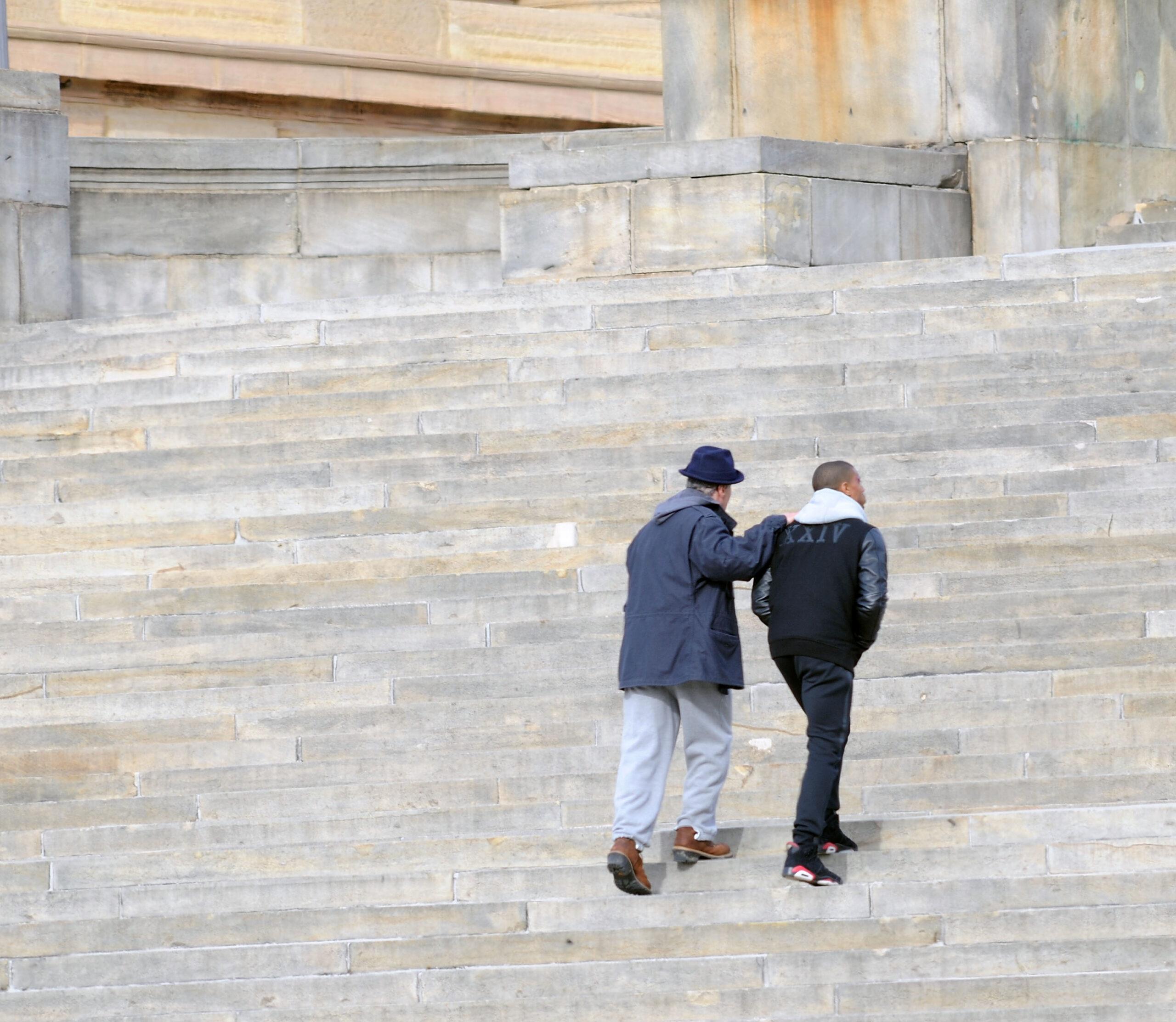
Part 4: “Like Climbing Into an Old Suit”
Creed was Coogler’s movie. But Rocky was still Sylvester Stallone’s franchise. Almost 40 years after playing the character for the first time, he was still the unofficial mayor of Philadelphia.
Coogler: He just knows so much—obviously about that universe, but also about filmmaking. The first training montage, he knew where we should take Adonis to run.
McTavish: Sly would be walking onto set every morning and shouting, “Yo, Adrian!” And that would get the extras going.
Stern: We were filming in Philly. You do not understand. Sly walks down the street, and it’s “Rocky! Hey, champ!” People screaming at him as the character. The first day we went to go scout the Rocky steps, a dude was filming himself in the Rocky wardrobe running up the steps. There is no other place in the world where a figure has really represented a city fictionally the way that Sly does.
McTavish: Just like climbing into an old suit. It was just really very, very familiar to him. And of course, very familiar to us. We grew up with that guy. And when you see him coming to life in front of you, for a moment, you’re like, “Wow, it’s Rocky, and he’s talking to me.”
Coogler: He totally opened himself up to me as a performer. But also, he opened himself up as a man who made a way for himself in the industry as an outsider. He would sit down and open up his script, and he would have all this writing—’cause he writes longhand, beautiful handwriting—of how he’s breaking the scenes down.
He would say, “I don’t know if Rocky would say that.” I had a line where I say he and Apollo were family. And what he said to me was like, “Rocky wouldn’t say that.” But he said he would say that they were “tight.” Half of the shit Rocky says is like straight Stallone shit. It actually helped me write Rocky better, but also, it helped me write older men better.
I think me and Aaron wrote him wet-bucket waking up Adonis. And he told us, “That’s too cliché.” We was like, “Yeah, you right.” And so I asked him, “How would Rocky wake Adonis up?” And he says, “Man, probably playing old records.” I was like, “Man, that’s perfect.”
Jordan: We were the odd couple, and it worked. You’ve got this older guy who’s retired and very, very sick, very prideful, stubborn in a lot of ways. And then you’ve got this young fighter with a lot to prove and energy and persistent as all hell and equally as stubborn. And you make them roommates. Oh, shit. That’s going to be interesting.
Stern: Rocky is introduced in this dark restaurant, coming up the stairs, not really lit, and just moving into this scene. Watching when he realizes who Michael is and starts putting it together in his head. He takes that step backwards. It’s a really subtle thing where he’s like, “No, that’s not possible …”
Jordan: Ryan did a great job at setting the table for us to have a lot of interesting moments.
Covington: The movie is a clash of culture, it’s a clash of generations, so it’s just funny to have Adonis say, “Unc.” And Rocky’s like, “What’s an unc?” Or “OG.” Or talk about the cloud. It might be the first crossover movie, you might say, that put “jawn” in the national vernacular.
Jordan: I think I called him “OG” in one take. He was like, “What the fuck is that?” I was like, “Yo.” But these are all real conversations that me and him had. The whole sleeping naked shit, the bit about the cloud. Those were improvs.
Thompson: The first time I met Michael B. Jordan was when we did the original chemistry test for Bianca. And I remember just a lot of energy in the room and a lot of laughter and an instant rapport.
Jordan: With Ryan giving us the space and freedom for us to play and find it, we got an opportunity to create a lot of moments.
Thompson: The first time that Michael comes to my house when we start dating and you see Adonis taking in her house, they have this really cute scene where he starts improvising music. That whole scene was completely improvised. Ryan was like, “OK, you’re coming to her house for the first time. What is that like for you guys?” We shot a continuous 25-minute take.
Stern: I mean, you’ve never seen a white athlete sit down with his girlfriend in a bed and delicately play with her hair intertwined with this incredibly intense scene about “Are you going to take [your father’s] name?”
Thompson: I remember at the time when the film came out, Black women especially were freaking out because you know as a Black woman, when you have braids, first of all, they take forever to put in and you need help sometimes from friends and family to take them down. But usually you’re doing it alone in front of the television and it’s laborious. It’s such an act of love, but it’s also so specific to having, I would say, a Black girlfriend. It’s a portrait of two people in love and a kind of intimacy, but particularly inside of Black identity, it’s so sort of specific to us. It’s something that I think we really understand, but everybody can understand.
Coogler: You make these PG-13 movies, and you’ve got to find ways to show intimacy, to imply intimacy, and also to show culture. The first Rocky is steeped in Italian culture. The name, the Italian Stallion. The fact that his identity even connects to the illicit trade that he’s in. The second one, when the priest blesses him in Italian before he leaves for the fight.
Adonis is from L.A., Bianca’s from Philly. He knows how to take down a box braid. From his mom, sister, maybe former girlfriends. He knows how to help. That’s a two-, maybe three-, four-person job. The physical closeness, the intimacy, all of that was important to show. It’s just some real shit.
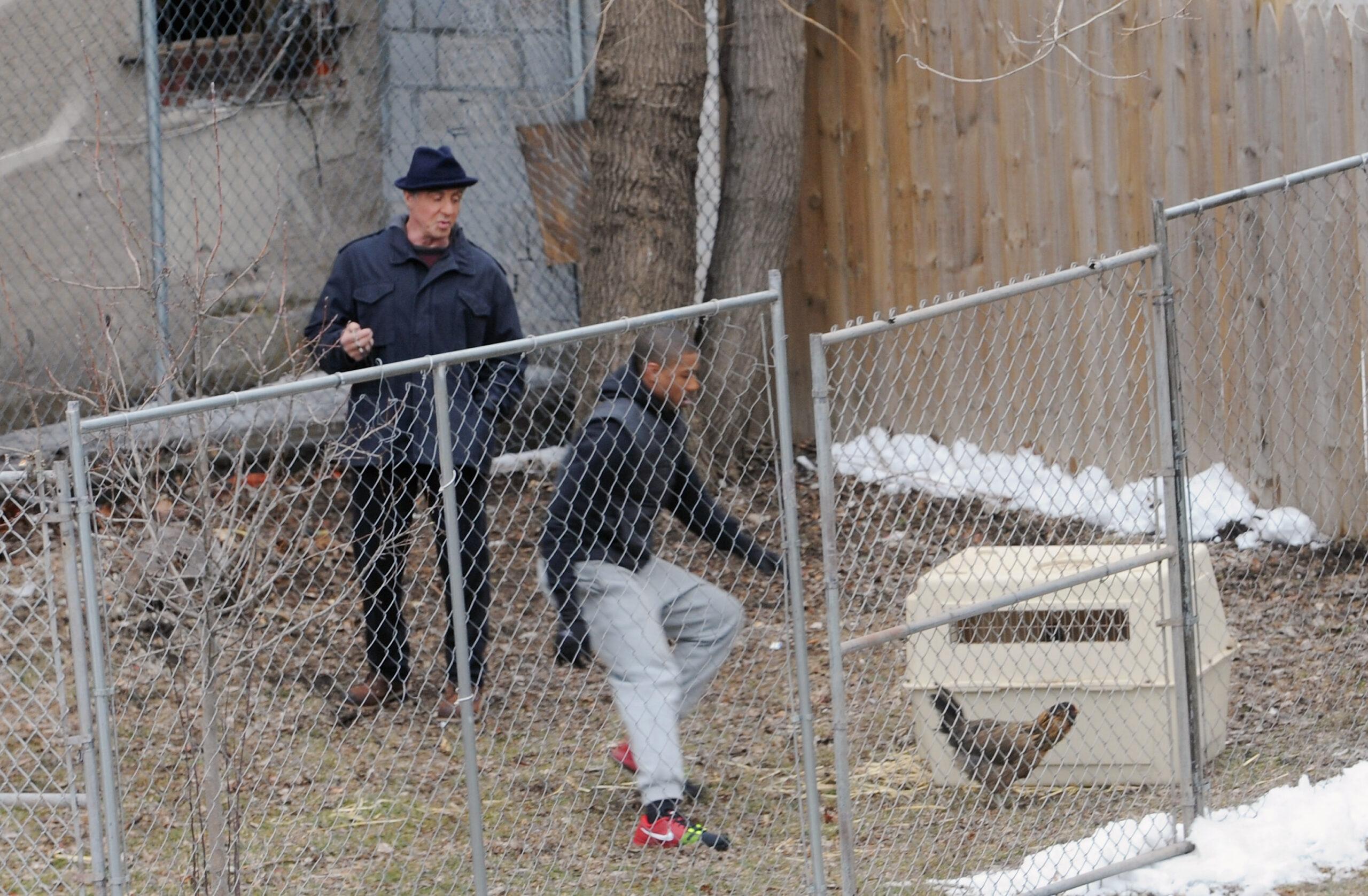
Part 5: “That Felt Right, It Felt Right, It Felt Right”
No Rocky movie would be complete without exhilarating training montages and boxing scenes. With the help of stunt coordinator Clayton J. Barber, Coogler, Jordan, and Co. made sure the action in Creed gave the audience goosebumps.
Jordan: It was like, “Am I really going to chase these chickens? Is this what we really want to do?” We were like, “Oh yeah, that’s a good popcorn moment. That’s a good franchise moment. We’ve got to do it. We’ve got to do the chickens.” Because it’s such an old-school thing. And then you’ve got this kid that’s like, “I’m not doing that shit. What are you talking about?” It’s always fun when you can get a character to voice what an audience may think.
Ward: Ryan and Michael, they were very humble about the whole process. They came to Oakland, they went to Philly, they were seeking out the nuances of the sport, the language, the verbiage, the mannerisms. When somebody humbles themselves like that, you have to respect it.
Bellew: I would give them tips and pointers on certain things—how to throw a punch, how a boxer really would react.
Ward: Everything that I had learned, to have my punches sharp and crispy and tight, it’s different in the movies. You have to exaggerate things, you have to understand camera angles. You have to sell a shot that you got hit with. But they did a great job of getting me ready.
Bellew: The way Sly was doing the choreography, he wanted it with head guards on, with 16-ounce gloves on. And me and Mike had quite a good synergy. He was an amazing athlete. We trained together. We’d box together. And before we knew it, we had 10-ounce gloves on with no head guard and was grazing each other’s face by this much.
Jordan: A system and formula that Sly gave us was we shoot the fights first. All the fights of the movie are done up front. Get that out the way.
Alberti: The first big fight in the film, we rehearsed and rehearsed. That was Ryan’s idea.
Shawver: He’s like, “Oh, we’re going to do this as a oner.” And I’m like, “The whole thing?” And he’s like, “Yeah.” I’m like, “Maybe get reactions from the crowd or Bianca, or can you set up a second camera and get some stuff just in case we have to cut away?” He’s like, “Nope, not doing that.” As a close friend of his, but also a collaborator, but also a fan, I’m like, “Let’s fucking go.”
Stern: The Sporino fight is the most classic version of our oner. Two and a half rounds.
Jordan: Which was super ambitious. But we love oners, man. The idea of those long takes, it’s really, really exciting to us.
Thompson: My heart has never been racing as much as it was that day because just the intensity of it felt very meta in a way. Bianca herself is rooting for Adonis, but I myself was rooting for Mike because I knew how hard he had worked to try to get this in one take.
Jordan: I think in a lot of ways what Adonis was feeling was a little bit what I was feeling. He’s walking out for his first pro fight; this is the first time I’m going out in this medium in a big way.
Alberti: We did, I think, 12 takes, and we used the 10th take, actually, for the performance at the very end of Sly and Mike, when everybody is like, “Woo!”
Thompson: It’s just a really electrifying way of shooting because everything kind of has to go right, and when it does, it almost feels like alchemy.
Shawver: The other thing Ryan had me do was compile any training montage I could ever think of. We were looking at, obviously, the Rocky movies. Everything from that to Step Up 3. It was like, “What is the coolest thing?” Really breaking it down.
Covington: One of the centerpieces that Ryan had, actually, was this training montage that ends with bikes. There was a documentary about bike riders, I think from Baltimore. It was a topic of conversation. Just the idea of these younger Black men who are riding these bikes as a form of recreation. This is an outlet for them, and it’s dangerous, but it’s also a sign of unity.
Alberti: We had seen those guys. They were all around the city. And right away, Ryan connected with that. That was going to be in the movie.
Jordan: That was our version of those kids that started to run with Rocky. It was incredible and trying to pay homage to Philly. It was also symbolic: This is the next generation. We can love Philly our way, and Philly can show us love in our way.
Göransson: Meek Mill was always the no. 1 on the list to work with on that montage. It’s such an incredible montage.
Stern: That kid, when he pulls up and goes, “You’re Creed’s son?” Then he’s like bup, bup, bup, zips off and wheelies down the street—that wasn’t a stunt guy. That kid is real. All those guys, everyone riding those bikes, those are not stuntmen. Those are all real people who live on that street and in that neighborhood. You couldn’t do that today. The studio would be like, “Never. It’s got to be all stuntmen.”
Jordan: It was so cold out there. I’m in this tech suit running. At the time, I’m like, “Yeah, I can run faster than the dirt bike. What are we talking about? Line them all up. How many times are we doing it? We running from here to there? All right, let’s go.” And take four I’m like, “Oh, shit, hold on. Wait a second. Slow down.”
Alberti: Michael was running, running, running. It was so much fun.
Jordan: “Now you’re doing doughnuts around him. OK, great.” And then Rocky comes out the window. I’m just getting goosebumps thinking about it, man. It was that moment that felt right, it felt right, it felt right.
Part 6: “Your Blood Flows Differently, Your Heart Beats Differently”
In the movie, the climactic bout between Adonis Creed and “Pretty” Ricky Conlan took place at Goodison Park in Bellew’s hometown of Liverpool. But beyond crowd footage shot at halftime of an Everton match, the fight was filmed in a ring at a soundstage in Philadelphia. Every detail was meticulously planned out. Although for a brief moment, when Conlan had to knock Creed down, things got real.
Jordan: I am in there with Tony Bellew. He is the legit nicest guy ever. Big Everton fan out here. But in the ring, he’s somebody totally different.
Coogler: Big fucker, bro. He hurts people for a living.
Bellew: I was on Sly from the first day I got there, winding him up about who he took punches off. Joe Frazier’s done his ribs, and Roberto Duran broke his face, and Dolph Lundgren nearly killed him. All these different fighters have beaten him up over the years. And he’s like [to Jordan], “But you haven’t took a punch off a real fighter.” And MBJ was like, from the start, “I’m not doing it, Sly. It’s not happening. No chance.” And [Stallone] just ground him down week after week after week.
Coogler: He would push Michael in ways I couldn’t push him as a director. We used the Phantom camera for this shot. I knew I wanted that extreme slow motion for when he was knocked down. It’s really strange because it captures basically just a few seconds at the frame rate that you need. Because it’s such a slow frame rate, it gives up the gag of a stunt punch. When you’re shooting thousands of frames per second, if that timing is not exact, you’ll see the head turn either too early or too late.
I’m showing Stallone. He looks at it, and he immediately is like, “Hey, he’s got to take the punch.” And when he said that, I said, “Sly, I can’t say that to him.” As a director, I can’t walk over to the actor and say, “Hey, you’ve got to get punched in the face.” And he was like, “I’ll say it to him.” Because Stallone, he don’t give a fuck. He’s 70 years old, and he had broken ribs. He walked right up to Mike and said, “Hey, you’ve got to take the punch.” And Mike, hearing it from Stallone, he was like, “All right, bro, I’ll do it.”
Bellew: In the end, it came out of the blue. MBJ, he said, “We’re doing it.” And I was like, “Mike, I’m not hitting you.” And he’s like, “Tone, I’m going to jump on a shot. You’re just going to do it, and we’re just going to get this out of the way.” I was like, “Mike, I’m not hitting you. I’m not chinning my little brother.” And he’s like, “Tone, let’s get it done.”
Coogler: Tony loved Mike. Tony didn’t want to hit him. With Clayton Barber, we had to work with Tone. He had to basically fake that he was using his body, but it’s an arm punch. It’s just Tony bringing his elbow around—which is enough to knock somebody out.
Bellew: Sly was standing behind my shoulder with his camera over my shoulders, and [MBJ] got on the shot. “Three, two, one …” And he’s on “three, two, one” about four to five times. “Nope, got to wait. I’m not there.” Back swing of my arm, back swing of my arm. … And then he jumped on it a bit too much, and I clipped him on the chin.
Coogler: Mike hung in there and took it, man, and fucking went down.
Shawver: The experimentation on that in the biggest moment, too, when Adonis gets knocked down, to cut to the people in his life that he cares about. We messed around with it a little bit. And I was like, “I’m thinking about cutting to flashes of maybe his mom and Rocky.” We did that, and it just didn’t feel right. And I go, “There’s one moment in Rocky where—it’s so quick—Creed kind of smiles at Rocky and taunts him a little bit.”
Coogler: I remember the first time we put that in there. It’s a special one, bro.
Shawver: It just tied everything together.
Coogler: And then he woke up. The other thing about Mike is he has an incredible feel for timing. He has a really fucking great sense of film time. It makes him really great for stunt work, but also great for performance.
Bellew: To get clipped like that and then to be able to wake himself back up, it was crazy. And I was heartbroken. But they got the dream shot.
Covington: The moment when Mike is in the final fight right before the final round, it was close to the end of the day, and we were trying to find the right line. Something just wasn’t really working. Ryan and Mike talk, and I’ve got the earpiece on, so I can hear. They’re in the ring, but everybody’s kind of taking a break ’cause we’re trying to figure out this moment. And Ryan is asking Mike, he’s like, “What do you feel in this moment?” He was like, “I just want to prove myself.” Stallone’s there, too. And I think eventually Mike says, “We’ve already done eight or 10 takes, and it is just not feeling right.” It is that kind of mythical movie thing that’s like, “It’s not bad, but we’re reaching for something we haven’t achieved yet.”And Mike was like, “I gotta prove I’m not a mistake.” And then as soon as he says that, Ryan’s like, “That’s it.”
Coogler: You get that moment where he finally says why he’s doing it. He self-identifies as a mistake. A great man’s greatest mistake is how he self-identifies.
Covington: We roll immediately. That’s one of the most memorable moments in the movie. And then the old theme song kicks in.
Stern: The first time you hear the actual Rocky theme, your blood flows differently, your heart beats differently. You get chills from a note.
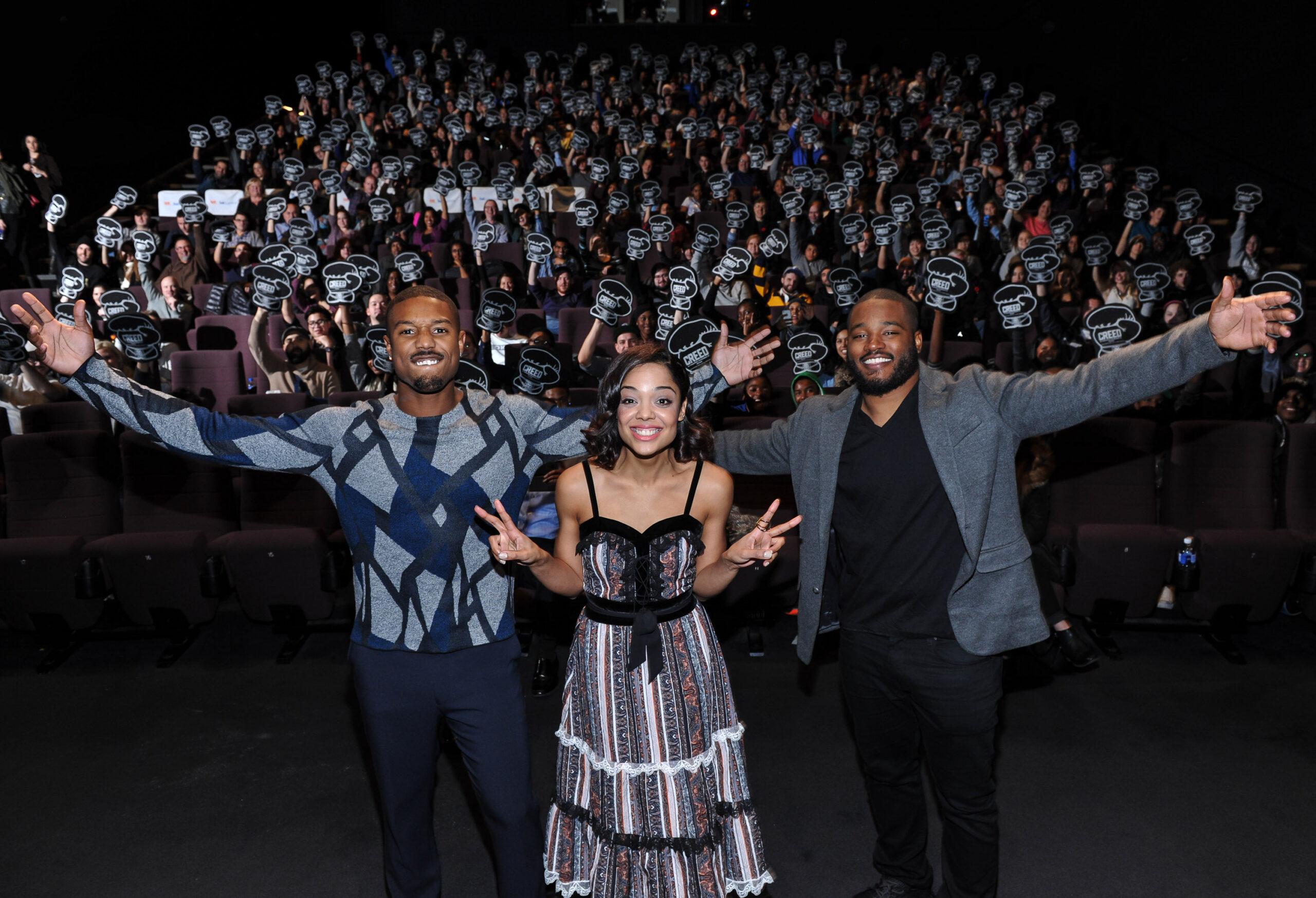
Part 7: “It’s Almost Like a Fairy Tale”
Just like in the original Rocky, the underdog can’t quite pull off the upset. But Adonis ends up the big winner. Creed hit theaters on November 25, 2015, and went on to gross $174.2 million globally. The blockbuster spawned its own franchise. Jordan and Coogler have now collaborated on five hit films together, including Sinners. Looking back on Creed these days makes them emotional.
Coogler: Look, man, it was a special movie, for sure. I can’t believe it’s been 10 years.
Jordan: I had this clean slate to approach this spinoff franchise, in the way that Adonis looked at his father in the first film—and Rocky, to a certain degree—as this foreign thing. Something that they knew a lot about and understood but didn’t know personally. And it became personal.
Bellew: I said this when I left the set: He could have a couple of amateur bouts and win. I mean, I wouldn’t mess the fucker’s pretty face if I was him, but he was unbelievable.
Harris: Who could ever predict that Creed would come from Rocky? Who could have confidence in that? It’s almost like a fairy tale. Ryan reached out to Sylvester Stallone? Come on. Nobody gets things done that way.
Jordan: One of the themes of the movie is “If I fight, you fight.” Rocky and Adonis. It’s the passing of the torch.
Covington: We had created a Google Doc, and I remember showing this to Ryan one time after everything. I was like, “This is when we started it. This was way back in school.”
Stern: Ryan put everybody on his shoulders and carried the whole thing from beginning to end.
Göransson: My highlight of that film was being at the scoring stage and recording that final montage with a live orchestra. And I think Stallone came by, and Michael B. came in, and Ryan was there, obviously jumping up and down, running into the room with the musicians, screaming. And also Irwin Winkler was there. My wife, Serena, was playing first violin. It was just such a big, happy moment to have. It was like my whole life was there.
Covington: Ryan’s just a force of personality. He really just unified everybody.
Bellew: He’s probably the hardest-working individual I’ve ever met.
Ward: It’s a young man in his 20s, but he’s commanding the room of a bunch of middle-aged people from all different walks of life, and he’s doing it with such ease.
Jordan: He’s consistently the same person—unapologetically him and always him. Which is one of his superpowers.
Thompson: The thing that’s extraordinary about Ryan’s filmmaking is it manages to be incredibly universal. And he makes these love letters to Black identity and the Black experience. He has this way of really humanizing us on film that I think is really powerful and radical and so much a part of his legacy. But you really see it expressed in that first Creed.
Coogler: That’s why those movies work. That’s why Rocky is him and Adrian in the pet shop or in the ice-skating rink, or they’re talking while he’s hanging on the fucking pull-up bar, or him and Mick in an apartment. It’s rare you get a movie that’s all set pieces. You need those small moments.
Jordan: The first time I met Carl Weathers was at the Creed premiere. And got a picture with him, talked with him, and he was really excited for me and for the film. He saw the film, and he fucking loved it.
Shawver: What I love about Ryan’s movies is that when you leave them, you take a breath. You forgot you weren’t breathing.
Interviews have been edited and condensed.
